- Home
- Alex Scarrow
Day of the Predator Page 19
Day of the Predator Read online
Page 19
Amid the confusion of movement and kicked-up dust Liam caught sight of something else. Dark shapes behind Liam caught sight of something else. Dark shapes behind them, half a mile away, smal er than any of the other species out on the plain. Just a glimpse of them, a second, no more. Then they were gone to ground, hidden among the knee-high tufts of olive-coloured grass scat ered in threadbare clumps across the open plain.
Liam turned to ask if anyone else had seen them, but the others were stil marvel ing at the sight of an entire food chain on the move, a thunderous spectacle of swaying folds of leathery skin and sinews taut with panic. He turned back to look again. Nothing. As if the dark shapes had never ever existed.
What the heck are those?
Vanished like skeins of dark smoke, like that ghostly seeker.
Or am I losing me mind now?
It was ful y ve minutes before some semblance of calm returned to the area; the various species of herbivores gathered in a worried-looking cluster a mile away. Tal necks protruded from the pack standing ful y erect, watching them from afar like impossibly large meerkats.
‘Oh, that was fun,’ said Laura. ‘Can we go do it again?’
Liam looked at Becks. Her face was folded with a confused expression. ‘Becks? What’s the mat er?’
She looked down at her st, stil bal ed up. ‘I did not hit it very hard.’
‘You must have hit a sensitive spot,’ said Whitmore. They made their way across the plain towards the coastline They made their way across the plain towards the coastline on the horizon, most of the time with Franklyn complaining about how Becks had ruined his chance to study the creatures up close. By noon they were standing among a scat ering of boulders and looking at a broad beach of dark coarse sand and a tranquil tropical ocean sending gently lapping waves of surf up the shingle and back down again with a soothing hiss.
‘So?’ said Liam.
Becks studied the view for a long moment, her eyes narrowed. ‘Twenty-one miles north-east of our current location.’
Liam grimaced. ‘So then it’s underwater, is it?’
‘Negative,’ she replied, pointing at the horizon ahead of them. ‘This is a large bay. Observe the horizon.’
Liam looked again, squinting. Then he saw it: a pale line of low humps on the horizon that he’d earlier assumed were clouds. Fol owing the uneven grey-blue line to the left he could see it becoming more distinct as it drew closer. The broad beach they were looking along seemed to promise that it was angling gradual y towards the distant spur of land and, if they were patient enough with it, it would link up with the spur eventual y.
‘Recommendation: we fol ow the beach around to the landmass ahead.’
Liam nodded at the low hump of land. ‘Is that the place we need to be?’
She nodded. ‘Information: the distance of the landmass is nine point seven six miles.’
is nine point seven six miles.’
Whitmore nodded. ‘Then that spur has to be it, right?
That’s what wil one day be the fossil bed.’
Becks nodded slowly. ‘Information: a ninety-three per cent probability you are correct.’
‘My God,’ he said, scratching his beard. ‘Who knows?
Some of the footprints we’l see along the beach over there might just end up being some of the fossils we’ve seen in museums in our time?’ His eyes widened and he shook his head incredulously. ‘Isn’t that the craziest idea?’ He slapped Liam on the shoulder. ‘Time travel must drive you insane if you think about it too much.’
Liam cocked an eyebrow. ‘Oh, I’ve had my share of headaches thinking on it, so I have.’
They stepped forward, down through the boulders and on to the coarse shingle. ‘This is good,’ said Becks to Liam, pointing at the beach. ‘We are not leaving tracks.’
He looked down. She was right. The beach wasn’t sand, it was a coarse gravel that clacked and shifted wetly underfoot, but left nothing as clear as a print behind them.
‘Oh, good.’ He nodded. ‘So there you go – something to put a smile on your face, then?’
She gave that some thought. ‘This is minimizing our overal contamination liability.’ Her gaze shifted from their feet back up to him. ‘Correct. That makes me … happy.’
‘There you go, you miserable sod,’ he replied cheerful y.
‘Things are looking up. We’l be home soon enough.’
They clat ered down through the wet shingle until the rst warm waves of tropical water hissed up to and rst warm waves of tropical water hissed up to and around their feet. Up ahead the others had decided to wade knee-deep into the sea and were splashing each other noisily. She pursed her lips in thought as she watched them, a curious gesture she must have picked up from one of the girls, Liam decided. A gesture that Bob’s muscular face would have struggled to reproduce. ‘If we successful y complete the mission, Liam O’Connor, and we return to the eld o ce, do you intend to retire me?’
‘Retire? What do you mean?’
‘Terminate this body and replace it with a male support unit? I heard Sal Vikram refer to this organic frame as a
“mistake”.’
He’d not given it much thought. Becks was Sal’s error –
she’d not bothered to check the gender marker on the containment tube – and they’d not had time to consider growing another. But certainly neither Maddy nor Sal had mentioned terminating her and disposing of her body.
‘Why would we want to go and do that, Becks?’
‘The male support frame is eighty-seven per cent more e ective than the female frame as a combat unit.’
‘Al right, maybe that’s true, but why’d the agency give us female babies as wel , then?’
‘Female support frames can be useful for covert operations where a female cover is required.’
He scratched his head. ‘Wel now, I real y don’t see why we can’t have one of each of you, you know? A Bob and a Becks. There’re no agency rules, are there, you know, against us having two support units in a team?’
against us having two support units in a team?’
‘Negative. I am not aware of any agency rules on that.’
‘So, wel , there you are … why not? We’l have two of you instead of one.’
They walked in silence for a while, Liam intrigued by how human her question had sounded.
‘Have I functioned as e ciently as the Bob unit?’ she asked after a while.
‘Yes, of course. I don’t know what we’d have done without you so far. But you know it’s stil so very weird. Aren’t you actual y Bob anyway? Or at least a copy of Bob in a di erent skin?’
‘Negative. My AI has adapted enough since being copied to be considered a di erent AI ident. I have experienced data that Bob has not. Also, the organic brain that is interfaced with the AI is genetical y di erent between the male and female support frames.’
‘Right. But … you remember being Bob, right?’
‘Of course. I recal al the incidents of our rst mission, right up until the moment you removed my chip.’
Liam wished he couldn’t remember that as wel .
‘Ugghh. Not something I’d like to do again in a hurry.’
‘You successful y preserved the AI. It contained six months of adaptive learning,’ she replied. ‘Both Bob and I are six months closer to ful y emulating human behaviour. We are both grateful.’
He shrugged modestly. ‘Oh, you know, it’s nothing. Just part of the job.’
‘I am able to kiss you,’ she said. ‘This would be an
‘I am able to kiss you,’ she said. ‘This would be an appropriate gesture of gratitude. I have data.’
She began puckering her lips and Liam felt that odd con icted sensation he’d felt after they’d rst arrived in 2015: a tingling excitement o set with a sense of revulsion.
Bob, in a girl suit … remember.
‘Uh … that’s OK, Becks. A thanks is more than good enough.’
‘A rmative. As you wish.’
‘Anyway, where the hel did you learn about kissing?’
‘I have a detailed description from a book I was reading while I was instal ed in the mainframe.’
‘Eh? What sort of books have you been reading?’
‘The book is entitled Harry Pot er and the Deathly Hal ows.’
‘What’s that?’
‘A novel. The digital le is in early twenty-rst century PDF format. The le’s original replication date is –’
‘Hold on,’ said Liam, stopping. ‘Do you have that le in your database stil ?’
She nodded. ‘My reading was interrupted. I wished to complete it. So I added it to my short-term cache.’
‘And would Bob also have the exact same le on the computer system?’
‘Of course.’
His mouth hung open. ‘There’s the code, then! Right there! That’s the code you could use! Isn’t it?’
Her eyelids ut ered as she processed the thought. ‘You Her eyelids ut ered as she processed the thought. ‘You are talking of a book code?’
‘That’s right, a Harry-Whatever-mijingamy book code.’
CHAPTER 41
65 mil ion years BC, jungle
Howard noticed the young boy walking alongside him, sloshing through the warm seawater.
‘Hey,’ he said.
Edward smiled. ‘Hey. You always cal ed Leonard, or do your friends cal you Lenny?’
Howard shrugged; not a question he’d anticipated being asked. ‘Uh … mostly just Leonard,’ he replied. ‘My mom cal s me Lenny, but I hate that.’
‘I heard someone say your best subject is math.’
He nodded. ‘It was my –’ He stopped, inwardly cursing.
‘It … is … my favourite school subject. Always loved math. It’s like, wel , I dunno … I suppose it’s like a sort of poetry that only a few people get. If you know what I mean? It’s, like, exclusive.’
Chan nodded. ‘Yeah, I know what you mean. That’s why I like it. It’s something I know and other people don’t. It makes me feel kind of special, I guess. Maybe that’s why I don’t have any friends at school, cos they think I’m odd.’
Howard nodded. ‘Yeah, I guess I’m the same. A loner.’
He squinted up at the bright sun. ‘Never ever get picked for sports, because I’m the geek.’ He shrugged. ‘But that’s OK, cos I never liked sports anyway.’
OK, cos I never liked sports anyway.’
Edward nodded. ‘Me neither. It’s for jocks and dit oheads.’
‘Dit o-heads?’ Howard laughed. ‘I like it.’
‘You never heard that expression?’
Not in my time, he almost answered. But instead he just shook his head.
‘Hey!’ said Edward suddenly, and bent down to scoop up a curious twisted ammonite shel from the shingle.
‘See? There are even bigger ones of those,’ said Howard, nodding at some of the others, wading waist deep in the clear blue water, occasional y ducking down to pul shel s out of the water to admire them.
They walked on in silence for a while, going a lit le further into the warm water. Up ahead, leading the way and deep in conversation, Howard could see the two
‘agents’ – Liam and his robo-girl. He shook his head at the irony of it. Despite their turning up in 2015 to ‘save’ Chan, they were al on the same side real y, al trying to prevent the nightmare of time-travel technology from destroying the world. Same goal … di erent methods. He wondered how he’d never come across this agency in al the years of his campaigning, al the ral ies and protests he’d been to
… and no one, no one, had ever suggested, even as a joke, that there might be an agency out there actual y using time travel itself to combat the corruptive e ects of time travel. He wondered who was behind it, who’d set it up. Surely not the American government? Not any government, in fact. The international y agreed penalties for that were fact. The international y agreed penalties for that were severe. No politician would have the guts to risk having anything to do with time travel, because international law was brutal and strict on this mat er. It was an automatic death penalty for any involved. The great Roald Waldstein had been a powerful speaker on the horrendous dangers of it. A great man, an in uential man. Howard’s smal campaigning group had achieved far less. His group was lit le more than bunches of students in universities and col eges around the world.
But this secret agency, they were going about mat ers in the wrong way. At empting to repair history that had been damaged by careless travel ers? That was very much like trying to close the barn door after al the horses have bolted. No – worse than that … it was having to go out and hunt al those horses down then drag them kicking and screaming al the way back to the barn. On the other hand, his campaign group’s approach had been far simpler.
Destroy the possibility of time travel at its very root. Instead of closing the barn door, they were burning the cursed thing down with al the horses stil inside. He looked at Edward Chan. The boy smiled back at him then looked down at the lustrous pink and purple sheen of the shel in his hand. He stroked the smooth surface, then held it out. ‘You can have it if you want it, Leonard.’
Howard shook his head. ‘No, it’s er … no thanks.’
He has to die, you know that, Howard? Burn the barn, right? Burn it long before any horses get out. right? Burn it long before any horses get out. He realized he was delaying the necessary, put ing it o and put ing it o . And yet he knew it had to be done. In theory the future – the future after the year 2015 – must already be changing, must have changed by now. It would be a world where this boy vanished in an explosion and never got to ful l his destiny. It was surely a world where a man cal ed Roald Waldstein would never become the gurehead of an international campaign, never become a bil ionaire from al his other inventions, never become a household name. And, yes, this world would stil have its problems: dwindling supplies of resources, global warming, rising seas, migrating bil ions and dangerous levels of over-population. But … at least it would no longer have the ever-present threat of complete and ut er annihilation dangling over it.
He’d once heard a speaker at a ral y ask the audience what must lie beyond the dimension of space-time we al exist in. Is it Hel ? And to meddle with dimensions beyond what we know was surely no di erent from opening a door to the devil himself and inviting him right on in. He’d spoken of a medieval artist cal ed Hieronymus Bosch who’d claimed he’d once caught a glimpse of the devil and the underworld and painted endless nightmarish visions of what he’d seen. Perhaps, the speaker had said, perhaps what he’d glimpsed were dimensions beyond our understanding, a momentary rip in space and time. Howard shuddered at the thought.
You know the boy has to die, Howard. Burn the barn. You know the boy has to die, Howard. Burn the barn. Burn the barn. What are you waiting for?
He was so deep in thought he didn’t at rst register the voices from further up the beach. Voices crying out a warning, screaming a warning back at them.
Edward grabbed his arm and yanked him hard.
Howard’s thoughts were shaken away.
‘What the h–?’
‘RUN!’ screamed Edward, pointing his nger at something behind him. Howard turned round to see an odd-looking dark wave approaching him fast. Water rol ed down either side of an enormous grey hump, sliding up the shal ows towards him like a gigantic torpedo. He spot ed a large n at the top of the large grey hump –
large, very large … the size of a car, no, bigger – the size of a bus!
Edward was stil pul ing him back from the thing, trying to get Howard’s leaden ght-or-ight response to do something. Howard started to react, but far too sluggishly, too clumsily. He stumbled backwards over something in the thigh-deep water and an instant later was ailing on his back, his head underwater. Surfacing a moment later, splut ering for air, his legs scrambling to nd a steady footing below, al he could see now was an approaching dark cave, riding up out of the shal ow water at him like a freight train
, a cave lined with stalactites and stalagmites of razor-sharp teeth and dangling tat ers of rot ing meat swinging between them.
‘OH NO!’ was al he could scream as the gliding mass of
‘OH NO!’ was al he could scream as the gliding mass of glistening grey hide nal y came to an abrupt rest and the cave, easily six foot across, snapped shut round one of his feet. He felt a vice-like grip on his ankle, the tough leather of his combat boots compressed agonizingly tight as something hard and sharp pressed from the outside. Then the beast began shaking its head vigorously from side to side and he knew bones had to be breaking and splintering in his ankle as he swirled through the water. Howard’s head was underwater. He felt pebbles, rocks and shel s grind painful y up his back, and knew that meant the creature was now manoeuvring itself back from the shal ows into deeper water.
He was holding his breath amid the tumbling
underwater chaos … and, for a eeting second, wondered why he was bothering to do so.
I’m gonna die. Surely bet er to breathe out now and drown than experience the agony of being ferociously dismembered by this thing?
Then, without warning the incredible pressure round his now-shat ered ankle was gone. He ailed with his arms to right himself, to nd solid ground on which to place his feet. He caught something with his hand, the rounded side of another ammonite shel . So that’s down. He tried to stand up and realized the creature must have pul ed him further out than he’d thought in those few seconds. Final y his head broke the surface and he realized the water was chest deep.
The air was thick with screaming voices and spray. The air was thick with screaming voices and spray. And the rst thing he saw was Chan, a few yards away, screaming abuse at the giant shark and jabbing his spear repeatedly at the creature’s nose. Its head snapped and swung from side to side, trying to get a grip on the fragile spear, trying to get past the spear to Chan, on whom it had decided to vent its frustration.
Howard waded through the water, painful y slowly, the chest-high sea in col aboration with the giant predator, wanting to slow him down. His one good foot kept slipping on the slimy rocks below, barely giving him enough purchase to make his way to shal ower water. Behind him he heard Chan stil hurling abuse and stil stabbing and prodding, and the hiss and roar of water turned frothy white by the enraged shark thrashing in the shal ows. Then he slipped again and fel under the water. He felt a hand under his arm, then another, lifting him clear again. It was the robo-girl.

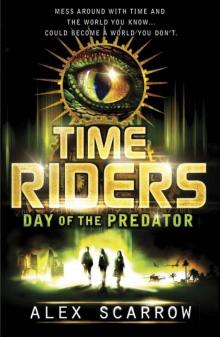 Day of the Predator
Day of the Predator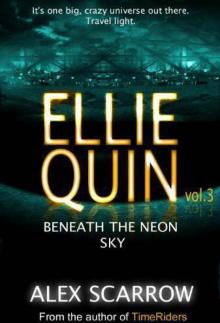 Ellie Quin Book 3: Beneath the Neon Sky
Ellie Quin Book 3: Beneath the Neon Sky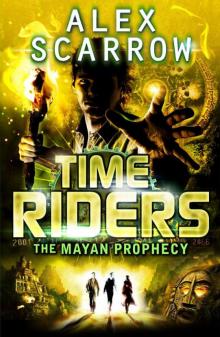 The Mayan Prophecy
The Mayan Prophecy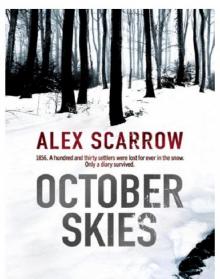 October Skies
October Skies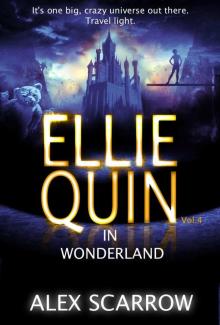 Ellie Quin Episode 4: Ellie Quin in WonderLand (The Ellie Quin Series)
Ellie Quin Episode 4: Ellie Quin in WonderLand (The Ellie Quin Series)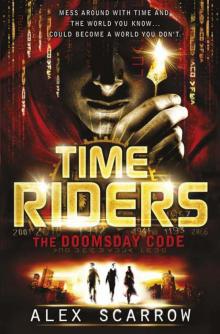 Time Riders
Time Riders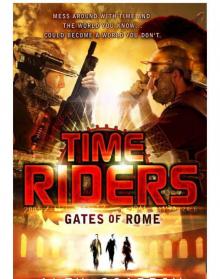 Gates of Rome
Gates of Rome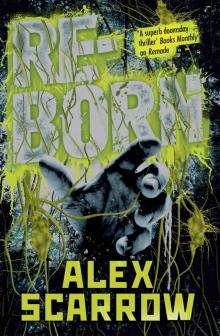 Reborn
Reborn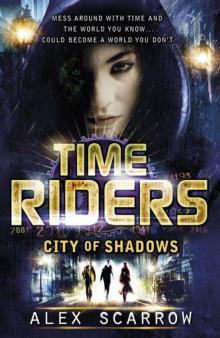 City of Shadows
City of Shadows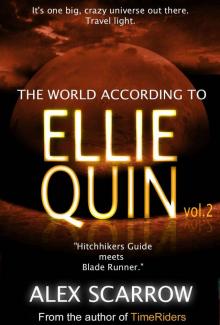 Ellie Quin Book 2: The World According to Ellie Quin (The Ellie Quin Series)
Ellie Quin Book 2: The World According to Ellie Quin (The Ellie Quin Series)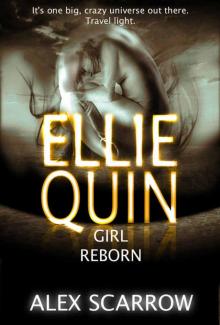 Ellie Quin Episode 5: A Girl Reborn
Ellie Quin Episode 5: A Girl Reborn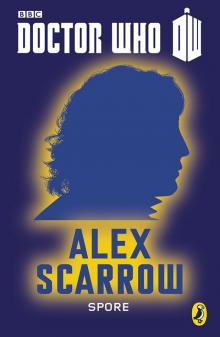 Spore
Spore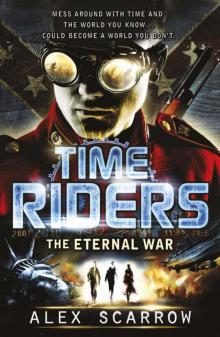 The Eternal War
The Eternal War Last Light
Last Light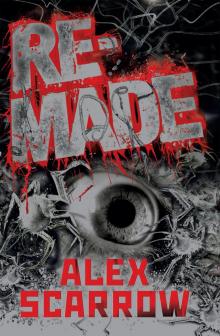 Remade
Remade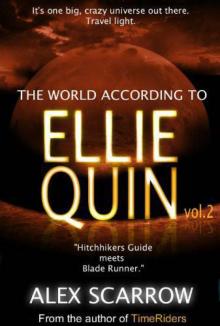 Ellie Quin Book 2: The World According to Ellie Quin
Ellie Quin Book 2: The World According to Ellie Quin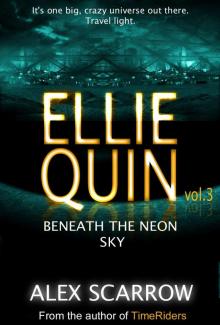 Ellie Quin Book 3: Beneath the Neon Sky (The Ellie Quin Series)
Ellie Quin Book 3: Beneath the Neon Sky (The Ellie Quin Series)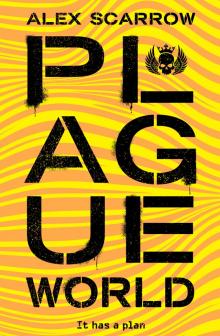 Plague World
Plague World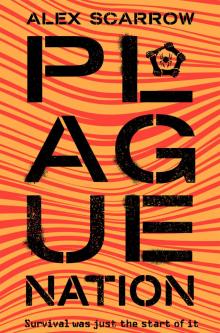 Plague Nation
Plague Nation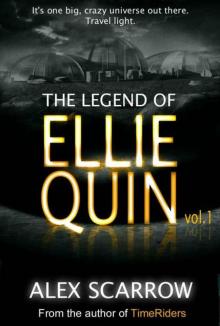 Ellie Quin Book 01: The Legend of Ellie Quin
Ellie Quin Book 01: The Legend of Ellie Quin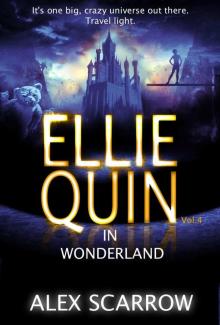 Ellie Quin - 04 - Ellie Quin in WonderLand
Ellie Quin - 04 - Ellie Quin in WonderLand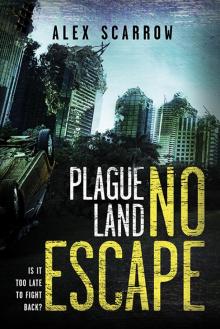 No Escape
No Escape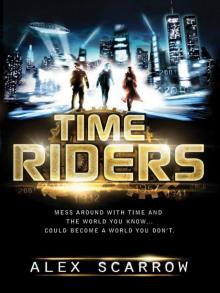 TimeRiders
TimeRiders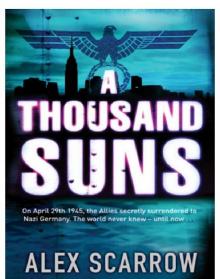 A Thousand Suns
A Thousand Suns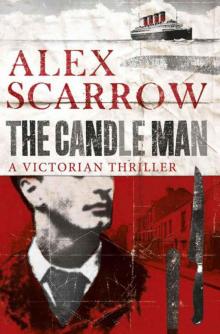 The Candle Man
The Candle Man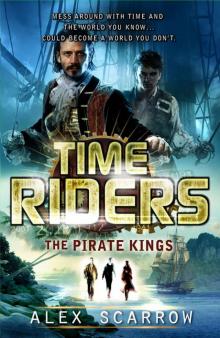 The Pirate Kings
The Pirate Kings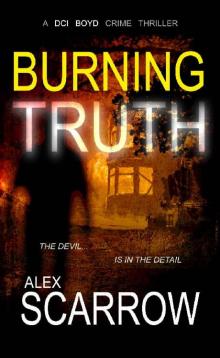 Burning Truth: An Edge-0f-The-Seat British Crime Thriller (DCI BOYD CRIME THRILLERS Book3) (DCI BOYD CRIME SERIES)
Burning Truth: An Edge-0f-The-Seat British Crime Thriller (DCI BOYD CRIME THRILLERS Book3) (DCI BOYD CRIME SERIES)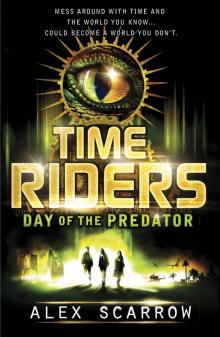 Day of the Predator tr-2
Day of the Predator tr-2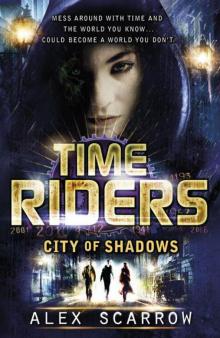 City of Shadows tr-6
City of Shadows tr-6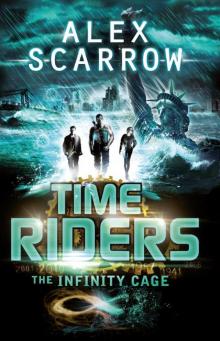 TimeRiders: The Infinity Cage (book 9)
TimeRiders: The Infinity Cage (book 9)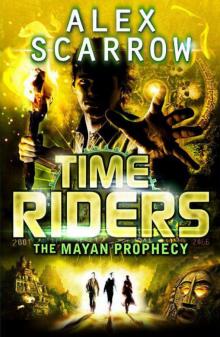 The mayan prophecy (Timeriders # 8)
The mayan prophecy (Timeriders # 8)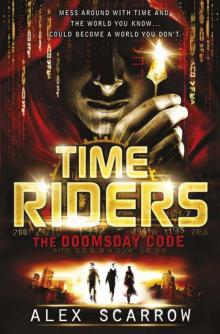 TimeRiders: The Doomsday Code (Book 3)
TimeRiders: The Doomsday Code (Book 3)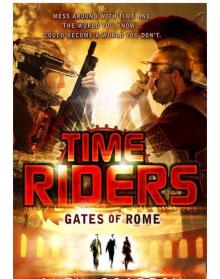 Gates of Rome tr-5
Gates of Rome tr-5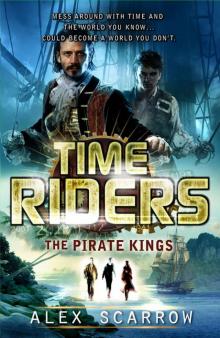 TimeRiders: The Pirate Kings (Book 7)
TimeRiders: The Pirate Kings (Book 7)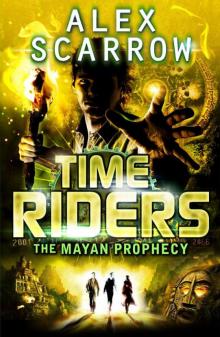 TimeRiders: The Mayan Prophecy (Book 8)
TimeRiders: The Mayan Prophecy (Book 8)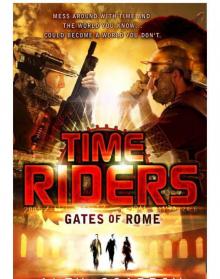 TimeRiders 05 - Gates of Rome
TimeRiders 05 - Gates of Rome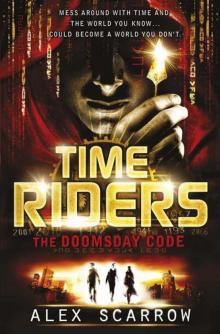 The Doomsday Code tr-3
The Doomsday Code tr-3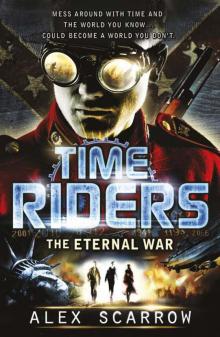 The Eternal War tr-4
The Eternal War tr-4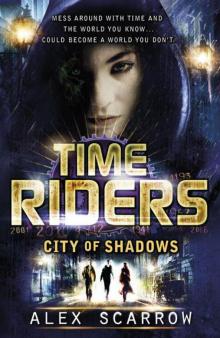 TimeRiders: City of Shadows (Book 6)
TimeRiders: City of Shadows (Book 6)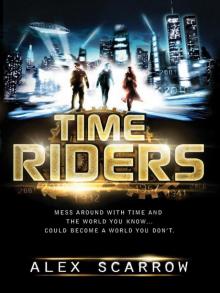 Time Riders tr-1
Time Riders tr-1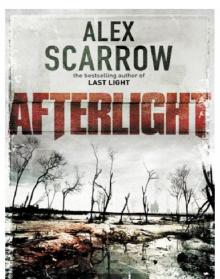 Afterlight
Afterlight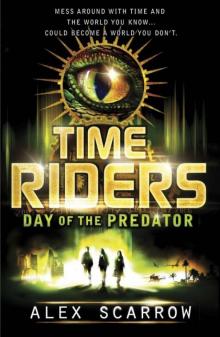 TimeRiders, Day of the Predator
TimeRiders, Day of the Predator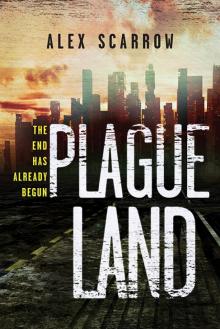 Plague Land Series, Book 1
Plague Land Series, Book 1